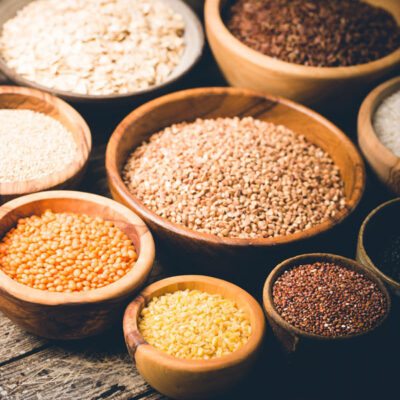Getting Started with the Keto Diet
Author: Admin Date Posted:8 December 2024

Ready for Keto? Here's how. The keto diet has been praised for its potential to aid weight loss, control blood sugar, and enhance mental clarity. Let's get started!
In recent years, the keto diet has gained significant popularity as a way to achieve weight loss and improve overall health. The ketogenic diet, or keto for short, is a low-carb, high-fat eating plan that aims to shift the body into a metabolic state called ketosis. In ketosis, the body burns fat for fuel instead of carbohydrates, resulting in weight loss and increased energy levels.
The keto diet has been praised for its potential to support weight loss, control blood sugar levels, and enhance mental clarity. However, it's important to understand the principles of the diet, its potential benefits, and considerations before diving in. Let's explore the ins and outs of the keto diet and help you make informed decisions about your dietary choices.
What Is The Keto Diet?
The keto diet, short for ketogenic diet, is a popular eating plan that involves consuming low amounts of carbohydrates while increasing the intake of healthy fats. The goal of this diet is to shift the body's metabolism into a state called ketosis. In ketosis, the body relies on fat for energy instead of carbohydrates.
The basic principles of the keto diet are as follows:
- Low Carb Intake. The keto diet significantly reduces carbohydrate consumption. This means limiting foods like bread, pasta, grains, and sugary treats that are high in carbs.
- Moderate Protein Intake. While protein is an essential macronutrient, it is consumed in moderation on the keto diet. This prevents excess protein from being converted into glucose, which could hinder the body from entering ketosis.
- High Healthy Fat Intake. The keto diet encourages a higher intake of healthy fats such as avocados, nuts and seeds, olive oil, and fatty fish. These fats provide energy and help the body stay in ketosis.
By following these principles, the keto diet aims to train the body to become efficient at burning fat for fuel, leading to weight loss and various other potential health benefits. However, it's important to note that the keto diet may not be suitable for everyone, and consulting with a healthcare professional is advisable before making significant dietary changes.
Keto Diet Macros
But what does that look like in real life? Achieving successful balance for ketosis goes beyond simply reducing the consumption of carbs, and relies on a carefully balanced ratio of macronutrients. Namely carbs, protein and fat.
The typical macro ratio for a keto diet is as follows:
- Carbohydrates. The keto diet requires a significant reduction in carbohydrate consumption. Generally, it is recommended to limit carb intake to around 5-10% of your daily caloric intake. This equates to roughly 20-50 grams of carbs per day, depending on your specific needs and goals.
- Protein. Protein intake should be moderate on the keto diet. Consuming too much protein can potentially hinder ketosis, as excess protein can be converted into glucose. Aim for around 20-25% of your daily caloric intake to maintain an optimal protein level.
- Fats. Healthy fats are the primary source of energy in the keto diet. They make up the majority of your daily caloric intake, typically around 70-75%. Include sources like avocados, nuts and seeds, olive oil, and fatty fish to ensure an adequate fat intake.
The simplest way to calculate your specific macro needs is to use an online keto macro calculator. This tool takes into account factors such as your age, gender, weight, height, activity level, and weight goals to provide personalized macro recommendations. By tracking your macros and staying within the recommended ranges, you can optimize your nutrition and support your body's transition into ketosis.
Don't forget though that you also need to listen to your body and become in tune with your own individual needs.
Before we move on to specifics, let's first consider the health implications of the keto diet.
Is Keto Good or Bad for You?
But is the ketogenic diet all it is cracked up to be, or just another potentially dangerous weight loss fad?
Benefits of the Keto Diet
The keto diet has gained popularity for its potential benefits beyond weight loss. While shedding pounds is often a motivating factor, this low-carb, high-fat approach can offer much more. Here are some potential benefits of the keto diet.
Weight Loss
Many people turn to the keto diet for its effectiveness in promoting weight loss. By reducing carbohydrate intake and increasing fat consumption, the body enters a metabolic state called ketosis. In this state, the body relies on stored fat for fuel, leading to accelerated weight loss.
Improved Mental Clarity
Another advantage of the keto diet is its potential impact on mental clarity and focus. When in ketosis, the brain utilizes ketones, a byproduct of fat metabolism, as an alternative energy source. This shift from glucose to ketones is believed to enhance cognitive function and provide a steady source of mental energy.
Increased Energy Levels
Many individuals report experiencing higher energy levels when following the keto diet. By minimizing fluctuations in blood sugar levels associated with carb intake, the body maintains a more stable energy supply, reducing energy crashes and providing sustained vitality throughout the day.
Reduced Hunger and Cravings
The keto diet's high-fat content can help keep you feeling fuller for longer, reducing hunger pangs and cravings. Additionally, the diet's impact on regulating insulin levels may contribute to reduced appetite, further supporting weight loss efforts.
Potential Positive Effects on Type 2 Diabetes
In addition to its impact on weight loss and energy levels, the keto diet has shown potential positive effects on certain medical conditions. Research suggests that the keto diet may be beneficial for individuals with type 2 diabetes, as it can help improve insulin sensitivity and blood sugar control.
By reducing carbohydrate intake and promoting the consumption of healthy fats, the keto diet may contribute to better glycemic control and potentially reduce the need for medication in some cases.
It's important to note that the benefits of the keto diet can vary from person to person. While many individuals experience positive results, it's essential to consult with a healthcare professional before making any significant dietary changes to ensure they align with your specific needs and goals, especially for individuals with pre-existing medical conditions.
Potential Challenges and Side Effects of the Keto Diet
While the keto diet offers many potential benefits, it's important to be aware of the challenges and side effects that may arise during the initial stages of adopting this eating plan. Here are a few considerations to keep in mind.
- Keto Flu. Some individuals may experience what is commonly known as the "keto flu" when transitioning to the keto diet. Symptoms can include fatigue, headaches, nausea, irritability, and difficulty concentrating. These temporary side effects occur as your body adjusts to using ketones as its primary fuel source. Staying hydrated, getting enough electrolytes, and gradually reducing carbohydrate intake can help alleviate these symptoms.
- Nutrient Deficiencies. Since the keto diet restricts certain food groups, such as grains, fruits, and some vegetables, there is a risk of nutrient deficiencies if the diet is not properly planned. It's important to ensure an adequate intake of essential nutrients, including vitamins, minerals, and fibre, by incorporating a variety of nutrient-dense foods into your meals. Consulting with a registered dietitian or healthcare professional can help you create a well-balanced keto meal plan that meets your nutritional needs.
- Digestive Issues. For some individuals, the high intake of dietary fats in the keto diet can lead to digestive issues such as constipation or diarrhoea. Increasing your fibre intake through low-carb vegetables, nuts, and seeds, as well as staying hydrated, can help promote healthy digestion.
- Restrictive Nature. The strict nature of the keto diet, particularly in terms of carbohydrate restriction, can be challenging for some individuals to sustain in the long term. It may require careful planning, meal preparation, and social adjustments, which can impact dining out and social gatherings. It's important to find a sustainable eating pattern that works for you and aligns with your lifestyle and preferences.
What Foods do You Eat on a Keto Diet?
Recommended Foods for the Keto Diet
When following a keto diet, it's important to focus on foods that are low in carbohydrates and high in healthy fats. Here are some recommended foods to include in your keto meal plan:
Healthy Fats
Avocados
Olive oil
Coconut oil
Butter
Nuts and seeds (such as almonds, walnuts, chia seeds, and flaxseeds)
Low-carb Vegetables
Leafy greens (such as spinach, kale, and lettuce)
Broccoli
Cauliflower
Courgettes
Bell peppers
Protein Sources
Eggs
Chicken
Turkey
Oily fish (such as salmon, tuna, and trout)
Beef, pork and lamb
Remember to choose quality sources of protein and opt for grass-fed, organic, or wild-caught options whenever possible.
Incorporating a variety of these nutrient-dense foods into your meals can help you maintain a well-rounded and balanced keto diet.
Ideas for Keto-friendly Meals and Snacks
Embarking on a keto diet doesn't mean sacrificing delicious and satisfying meals. Here are some examples of keto-friendly meals and snacks to keep you fueled and satisfied:
1. Breakfast
- Scrambled eggs with spinach, mushrooms, and feta cheese
- Avocado and smoked salmon on a bed of lettuce
- Chia seed pudding made with coconut milk
- Keto granola with almond milk
Read more about enjoying cereal for breakfast on a keto diet.
2. Lunch
- Grilled chicken Caesar salad with plenty of leafy greens, Parmesan cheese, and a creamy dressing
- Zucchini noodles with pesto sauce and grilled shrimp
- Broccoli and cheddar soup with a side of mixed nuts
3. Dinner:
- Baked salmon with a lemon butter sauce, served with steamed asparagus
- Cauliflower crust pizza topped with cheese, pepperoni, and veggies
- Stir-fried beef with broccoli and bell peppers in a soy-ginger sauce
4. Snacks:
- Almond butter with celery sticks
- Cheese slices and cucumber slices
- Hard-boiled eggs
Remember, the key is to choose foods that are low in carbs, moderate in protein, and high in healthy fats. These examples provide a starting point, but feel free to get creative and tailor your meals to suit your taste preferences.
Top Tips for Success on the Keto Diet
Embarking on the keto diet can be an exciting and rewarding journey towards improved health and vitality. To help you get started and stay on track, here are some practical tips to maximize your success.
- Plan Your Meals. Invest some time in meal planning to ensure you have keto-friendly options readily available. Stock up on low-carb vegetables, healthy fats, and protein sources to create balanced meals.
- Track Your Macronutrients. Monitoring your macronutrient intake is essential on the keto diet. Use a food tracking app or journal to keep track of your carbohydrates, proteins, and fats to ensure you're staying within your desired keto ratios.
- Stay Hydrated. Proper hydration is crucial for overall well-being, especially on the keto diet. Make sure to drink plenty of water throughout the day to support your body's functions and prevent dehydration.
- Include Healthy Fats. Embrace healthy fats as a cornerstone of your keto meals. Avocado, coconut oil, olive oil, nuts, and seeds are excellent sources of healthy fats that can keep you satisfied and provide essential nutrients.
- Experiment with Recipes. Don't be afraid to try new recipes and get creative with your meals. There are plenty of delicious keto-friendly recipes available online that can add variety and excitement to your diet.
- Listen to Your Body. Pay attention to how your body responds to the keto diet. Everyone's experience is unique, so make adjustments and modifications based on your own needs and preferences.
- Seek Support. Join keto communities, online forums, or find a buddy who is also following the keto diet. Having a support system can provide motivation, accountability, and a space to share ideas and experiences.
Remember, the keto diet is not just about weight loss but also about promoting overall health and well-being. Stay consistent, be patient with yourself, and enjoy the journey towards a healthier lifestyle.
Listening to your body is of particular importance as everyone responds differently.
Tune in to Your Body: Listen and Adjust
One of the key aspects of the keto diet is understanding and responding to how your body reacts to it. Each person's experience with the keto diet is unique, so it's important to pay attention to how your body responds and make adjustments accordingly. Here are a few tips to help you navigate your keto journey.
- Be Mindful of Energy Levels. Notice how you feel in terms of energy levels throughout the day. Some people experience an initial adjustment period, often referred to as the "keto flu," where they may feel fatigued or low on energy. However, as your body adapts to using ketones for fuel, many individuals report increased energy and mental clarity. If you're feeling consistently drained, it may be worth assessing your nutrient intake, hydration levels, and overall dietary balance. Anxiety and restlessness at night can also be issues, as carbs are natures prozac.
- Listen to Hunger and Fullness Cues. Pay attention to your body's hunger and fullness signals. The ketogenic diet can naturally help you feel more satiated due to its higher fat and protein content. However, it's still important to eat until you're comfortably full and not restrict yourself excessively. If you find yourself constantly hungry or overly restricted, consider adjusting your portion sizes or adding more nutrient-dense foods to your meals.
- Monitor Digestive Health. Changes in your diet can impact your digestive system. Some people may experience digestive discomfort or changes in bowel movements when starting the keto diet. If you notice any persisting issues, such as constipation or digestive upset, it may be helpful to incorporate more fibre-rich vegetables and stay hydrated to support healthy digestion.
- Stay Hydrated: Proper hydration is crucial for overall health and well-being. The keto diet can have a diuretic effect, causing increased water loss. To prevent dehydration, ensure you're drinking enough water throughout the day and consider adding electrolytes to your routine if needed.
Remember, everyone's body is unique, and what works for one person may not work for another. Trust your body's signals and make adjustments based on your own needs and preferences.
In conclusion, embarking on a keto diet can be a transformative experience for many individuals seeking weight loss and improved health. By focusing on low-carb, high-fat foods, you can tap into your body's remarkable ability to utilize fat as a source of energy. However, it's important to approach the keto diet with caution and make adjustments that suit your unique needs. Remember to listen to your body, stay hydrated, monitor your digestive health, and prioritize nutrient-dense foods.
Keep in mind that sustainable and long-term success comes from finding a balance that works for you. Consult with a healthcare professional or registered dietitian to ensure you're meeting your nutritional requirements and to address any concerns or questions along the way.
With the right approach, the keto diet can become a sustainable lifestyle choice that helps you achieve your health and wellness goals.
Our keto granola could be just what you are looking for if you are missing that classic breakfast crunch.



